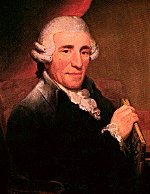
 |
|
Franz Joseph Hayden Father of classical music. |
 |
|
Wolfgang Amadeus Mozart Master of the Piano Concerto. |
 |
|
Ludwig van Beethoven Unequalled in the String Quartet. |
 |
|
Gustav Mahler The Greatest Symphonist. |
Music is a special art form. Think about it. All the other arts produce physical and tangible creations. But, what is it about hearing a series of notes dancing through the air that creates mood, stirs emotion, and inspires us to take the art with us by humming or whistling the tune? That’s not the same as seeing a movie or play or painting, as touching a sculpture or reading words of poetry and prose. Music is ethereal by nature. Try to point to it, to capture and define it. Utterly hopeless.
I am not trained in music. I’ve never even had a music appreciation class. So, the likelihood of someone like me developing a taste (let alone a passion) for classical music is pretty slim. In my youth, I couldn’t stand the stuff. I couldn’t comprehend the difference between Beethoven or Bach. It was all just noise.
I cut my musical teeth on the Eagles, Jackson Browne, Neil Young, U2, the Police, and Dire Straits. Later, I became interested in the blues and jazz. I continue to listen to all that stuff. I still have a turntable and pull out my old LP’s on occasion just to kick back and remember. Today I sometimes listen to what’s called “new rock.” R.E.M. and Pearl Jam are pretty decent bands.
All forms of music interest me. Willie Nelson, Miles Davis, Pat Metheny, even African tribal music and the sounds of the Indian sitar…you name it, I’ve probably listened to it. So, in one sense, my interest in classical music is no mystery. It is merely an extension of an art form that I’ve always found alluring.
On the other hand, classical music is complex and uncommon. It requires a modest bit of study to fully appreciate what it is you are actually hearing. It is neither as intuitive nor as improvisational nor as “user friendly” as many of the other forms. You don’t typically “get down” to Bach’s Mass in B-minor nor do you put a quarter in the jukebox after a few beers and punch the button for Schubert’s "Trout" Quintet.
These pieces of music have been performed and admired for well over a century. This longevity implies more than just a tradition, it is a truth about our humanity. They speak to something eternal in us that will be just as relevant 100 years from now as it is today. By contrast Jackson Browne’s “The Pretender” album was probably the greatest pop musical effort of the 1970’s. But, doubt it will be appreciated as much as, say, Beethoven’s “Moonlight” Piano Sonata in the year 2070.
I didn’t always see classical music this way. Initially, I became interested in it as a purely historical phenomenon. In reading the work of Arthur Schopenhauer I came to understand music’s unique ability to communicate the essence of the human spirit in a given time and place and saw classical composers as recorders of that spirit through the last few centuries. Their work afforded me an opportunity to place myself in the shoes of past lives and, in some sense, appreciate their intimate grasp of the distinctive reality of their time while accentuating something perpetual as well.
In the mid-1980’s I happened across Schubert’s “Unfinished” Symphony. That was the first time I was literally blown away by anything classical. Such unfulfilled yearning I’d never experienced in music before. It resonated with my own experience and suddenly I realized that this was no longer just some kind of experiment in historical interpretation for me. It was a living force.
Of course, all music achieves this in some form or another. But, whereas the compositions of rock or country or even jazz speak to us in brief but apropos utterances or phrases, a classical approach to human experience beckons in long paragraphs and complete chapters. Classical music uniquely takes the opportunity to explore themes in a greater depth, to show us seemingly endless variations and intense juxtapositions in a variety of established formats and forms that give it a richness beyond compare among the musical styles of the world.
My classical collection is large, but by no means complete. I’ve worked on developing it with some vigor over the years. There is still much room for additions to my private library, but there is much that is well covered. I begin the Gregorian chants and conclude with recent works by the likes of John Adams and Witold Lutoslovski.
Up to Haydn
Mozart
Beethoven
Schubert to Wagner
Mahler
Webern to Shostakovich
Since 1950
[Back to the KeithStuff Home Page]
Classical Composers Database: A work-in-progress. Over 1,000 composers listed.
G. Schirmer, Inc.: Assocated music publishers site that contains a great deal of information on composers and the clasical music repertoire.
The Catalogue of Classical Composers: This catalogue is a reference to the history of classical music through the biographies of the composers that wrote it.
Music History 102: A nifty guide to Western Composers and their Music from the Middle Ages to the Present.